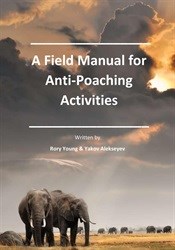The campaign group Save the Elephants estimates that between 2010 and 2012, 33,000 elephants were slaughtered for their ivory each year. Last year, 1,004 rhino were killed in South Africa alone. In the central African region the illegal bush-meat trade totals up to 3.4 million tons per year, with poachers targeting primates, antelope, carnivores, rodents and fish.
Wildlife loss however is dwarfed by the illegal trade in flora. Currently, up to 90% of wood and wild plant products are believed to come from illegal sources.
Population increase
With a projected human population increase in Africa of another 1.1 billion people by 2050, and increasing global demand for Africa's wildlife products, continued poaching will lead to widespread extinction and large-scale deforestation, with impacts felt globally.
To address this complex issue, Rory Young, a professional tracker with 25 years' experience, alongside a number of security professionals with experience in investigations, special operations, and law enforcement have developed this doctrine. The combined experience of these contributors has created a doctrine capable of tackling poaching from every angle and at every step of the process.
"Right now, organisations often end up latching onto expensive technology or super-warrior as the magic formula to tackling the issues of wildlife protection," David Youldon, CEO for the Zambian based ALERT said. "There are also many programs where serving and former foreign military men train scouts according to established military doctrine. This is just not the answer. Most of these troops are sent out and cannot find the 'enemy'.
"This is because poachers, although often skilled fighters, are not conducting a military campaign and they are past masters at not being found. Conventional military practices do not apply. What is needed in this struggle is a comprehensive doctrine, developed specifically for the complex and organised crime that poaching is, and that addresses all the problems with objective and inexpensive solutions," Youldon explained.
Free training
Co-author Rory Young explained that through ALERT he intends to provide training free of charge to Africa's anti-poaching units to increase their effectiveness. "Training is conducted within local and international laws and adapted to local conditions and sensitivities. Wherever possible local trainers are to be used, and, the training of local individuals able to provide future training, is always the primary goal. What we need is for these improved techniques to spread like wild-fire."
Lisa Groeneweg of Chengeta Wildlife, who is overseeing fund raising to implement the training programmes, explains, "At the moment we have sufficient funding to continue offering training courses for the next few months, but we urgently need more donations to meet the huge demand from African governments and anti-poaching units for training, as well as sponsors of the manual so that we can provide all rangers and scouts working in anti-poaching in Africa with a copy."






































